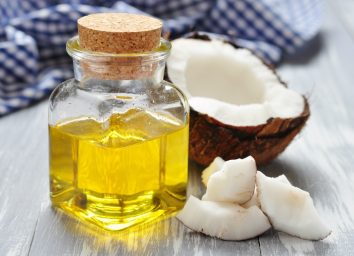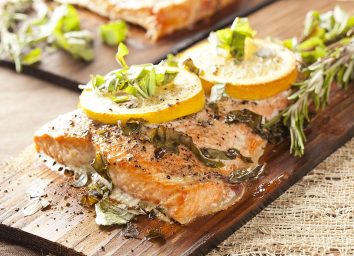8 Benefits of Eating Healthy Fats
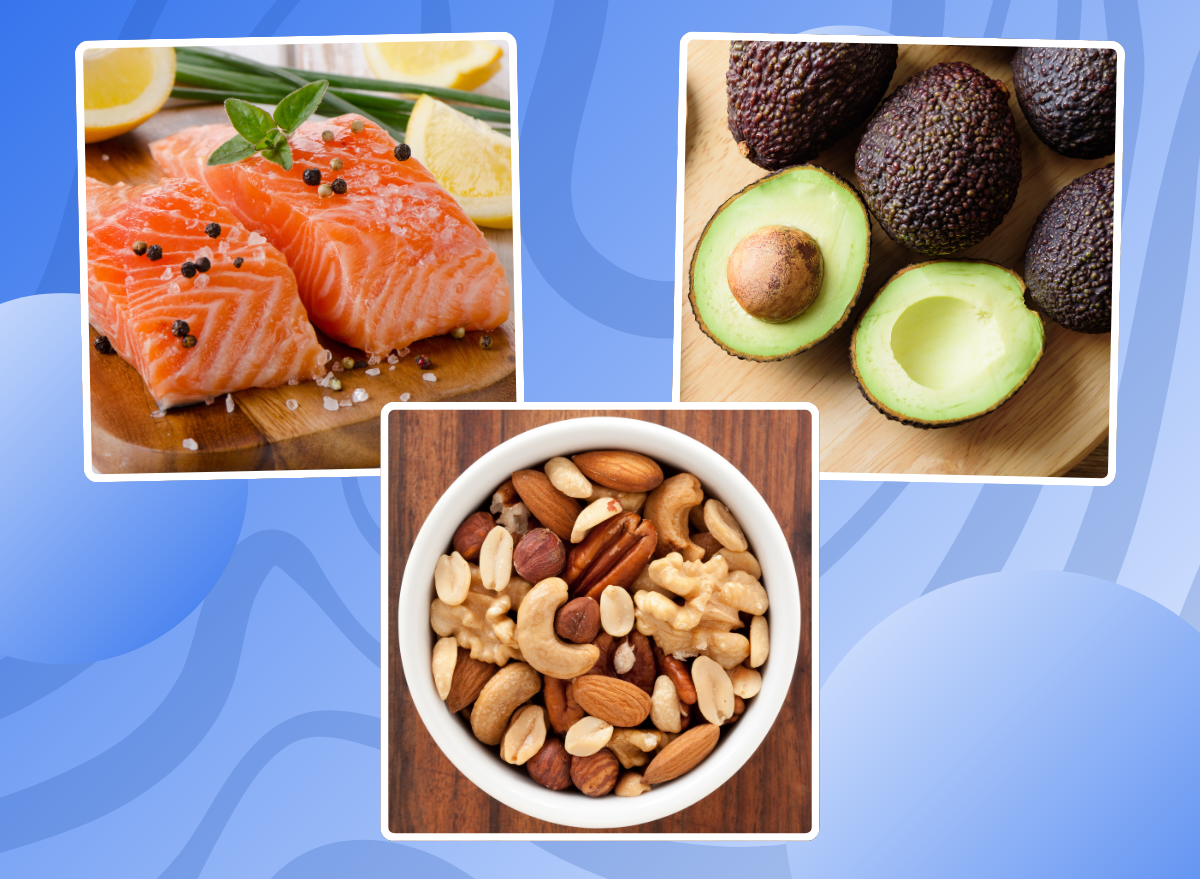
When it comes to navigating the world of fats, it’s important to remember that not all fats are created equal. Despite sounding a bit counterintuitive, eating fat doesn’t necessarily make you fat. The key to including fat in a healthy diet is understanding which fats are considered healthy and which ones aren’t.
Healthy fats, like monounsaturated and polyunsaturated fats, play a pivotal role in many aspects of our health. Food sources of healthy fats include fatty fish (like salmon), olive oil, nuts, and avocado. On the other hand, unhealthy fats—primarily trans fats and excessive saturated fats—are those that are linked to negative health outcomes, including elevated cholesterol. These unhealthy fats are commonly found in fried foods, ultra-processed snacks, and baked goods.
We can’t reiterate how important it is to include healthy fats in your diet. (The Academy of Nutrition and Dietetics recommends aiming for 20–35% of your daily energy intake from mono- and polyunsaturated fats.) Wondering why we are staunch #teamfat members? Keep reading to learn eight potential benefits of eating healthy fats, especially when they are included as part of a balanced and healthy diet.
You May Have Improved Heart Health
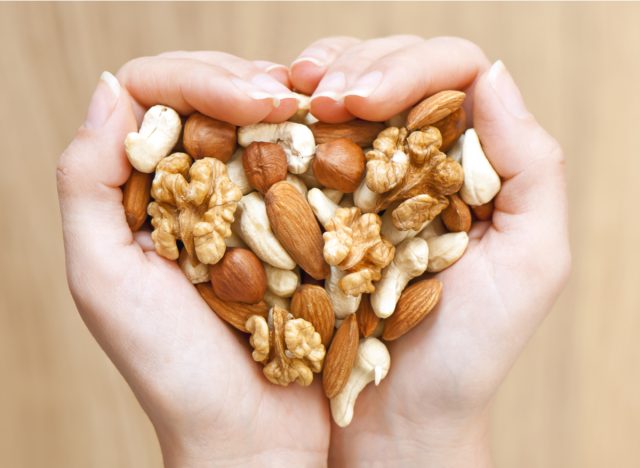
Incorporating healthy fats into your diet is crucial for maintaining heart health. These fats, which include monounsaturated and polyunsaturated fats, play a vital role in lowering harmful cholesterol levels. They help to reduce low-density lipoprotein (LDL) cholesterol, also known as the “bad” cholesterol, which, when elevated, can lead to atherosclerosis—a condition characterized by narrowed and hardened arteries that can precipitate heart attacks and strokes. Foods rich in these beneficial fats are not only nutritious but also add variety and flavor to a heart-healthy diet.
Furthermore, the omega-3 fatty acids found in fish like salmon, mackerel, and sardines, as well as in flaxseeds and walnuts, are particularly noted for their cardiovascular benefits. Omega-3s are known to reduce inflammation, which can damage blood vessels and may elevate one’s risk of heart disease. They also may lower triglycerides, stabilize the heartbeat, and lower blood pressure.
You May Have Enhanced Brain Function
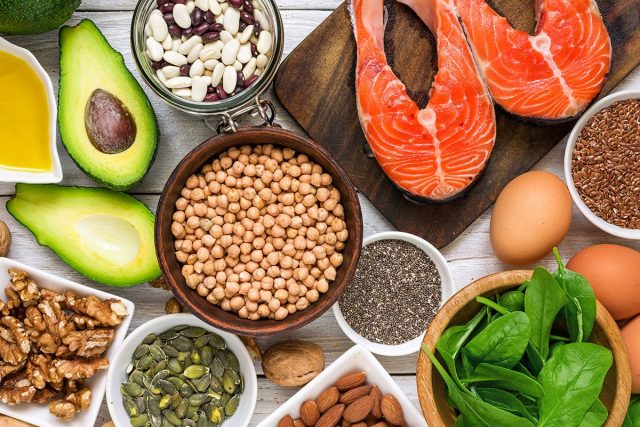
Healthy fats, particularly omega-3 fatty acids found in fish, nuts, and seeds, play a critical role in brain health and cognitive functioning. These fats are essential components of the brain’s structure, contributing to the flexibility and integrity of cell membranes. This flexibility allows for better communication between neurons, enhancing memory, learning, and overall brain functionality. Omega-3 fatty acids are also known for their anti-inflammatory properties, which can help protect the brain against aging and neurodegenerative diseases (like Alzheimer’s Disease).
You May Experience Weight Management Support
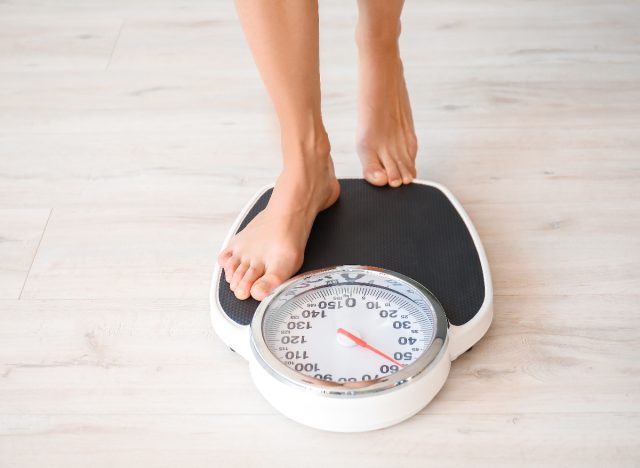
Healthy fats play a crucial role in weight management, primarily by promoting satiety, which may help in reducing your overall intake of calories. Foods rich in these fats have a higher satiety value, which helps in keeping you full for longer periods. This feeling of fullness may discourage overeating and unnecessary snacking, which is essential for maintaining a healthy weight.
You May Have Optimal Nutrient Absorption
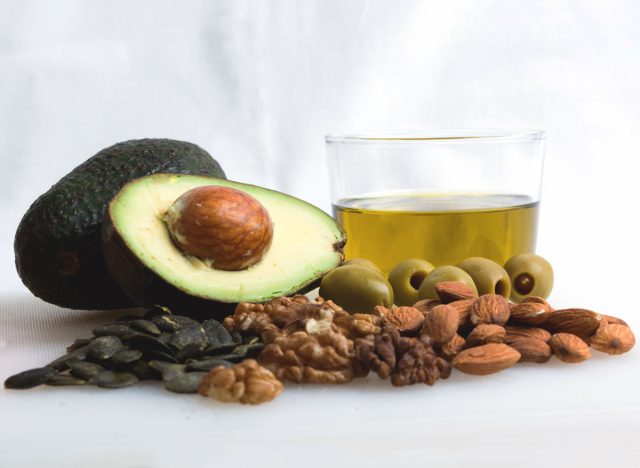
Healthy fats play a critical role in the absorption of fat-soluble vitamins, which include vitamins A, D, E, and K. These vitamins are essential for various bodily functions, from maintaining vision and skin health to supporting the immune system and blood clotting. The presence of dietary fats enhances the solubility of these vitamins in the intestine, facilitating their absorption into the body. This is because fats create a solvent environment for these vitamins, allowing them to dissolve and be readily taken up by intestinal cells for transportation throughout the body.
You May Have Enhanced Eye Health
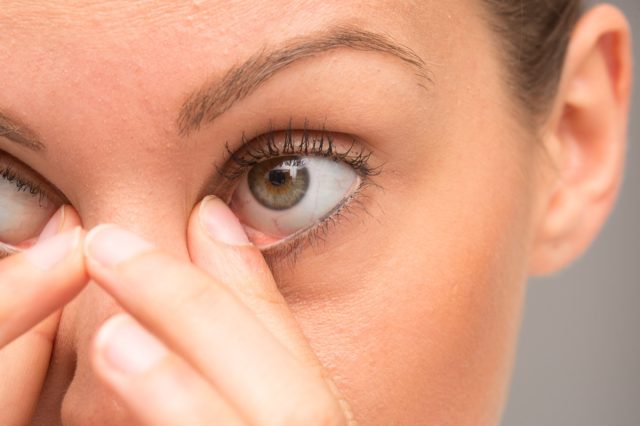
Healthy fats, particularly omega-3 fatty acids, are crucial for maintaining optimal eye health and vision. Found abundantly in fish like salmon, mackerel, and sardines, as well as nuts and seeds, these fats are essential components of cell membranes, including those in the eye. They play a significant role in supporting the health of the retina, where they help maintain the integrity of the nervous system and combat inflammation, potentially reducing the risk of conditions like macular degeneration.
Furthermore, omega-3 fatty acids aid in the production of the eye’s natural tear film, a critical factor in keeping the eyes hydrated and comfortable, especially for those who suffer from dry eye syndrome. This protective layer is vital for warding off infections and ensuring that our eyes function correctly without irritation or fatigue.
You May Experience Immune System Support

Healthy fats support immune health. These fats contribute to the integrity of cell membranes throughout the body, including immune cells. This structural integrity is essential for allowing immune cells to effectively communicate and respond to invading pathogens, thus bolstering the body’s defense mechanisms.
Additionally, omega-3 fatty acids possess anti-inflammatory properties that help modulate the immune system’s response. By reducing inflammation, omega-3 fatty acids can help maintain an appropriately responsive immune system, proving especially beneficial in managing autoimmune diseases and allergies.
You May Have Reduced Inflammation

Healthy fats play a crucial role in combating inflammation, a root cause of many chronic diseases. Foods rich in omega-3 fatty acids have been shown to reduce the levels of inflammatory markers in the body. Additionally, monounsaturated fats also contribute to reducing inflammation.
You May Experience Balanced Hormone Levels

Eating healthy fats supports hormone levels within the body, contributing significantly to overall health and well-being. Fats, particularly omega-3 fatty acids, are foundational for the production and regulation of certain hormones, including those that are responsible for controlling metabolism, growth, immune function, and reproductive health. By incorporating a balanced amount of healthy fats into one’s diet, individuals can ensure that their body has the necessary building blocks to produce hormones effectively, leading to improved hormonal balance and function.
Additionally, fats aid in the absorption of fat-soluble vitamins, which are vital for hormonal health. Vitamins such as A, D, E, and K, the four fat-soluble vitamins, are crucial for maintaining the delicate balance of hormones in the body. Therefore, consuming an adequate amount of healthy fats not only supports hormone production but also ensures their optimal function and distribution, underscoring the importance of fats in a hormone-healthy diet.
- Source: Vannice, G., & Rasmussen, H. (2014). Position of the academy of nutrition and dietetics: dietary fatty acids for healthy adults. Journal of the Academy of Nutrition and Dietetics, 114(1), 136–153. https://doi.org/10.1016/j.jand.2013.11.001
- Source: Heart.org: "The Skinny on Fats"
- Source: Linton MRF, Yancey PG, Davies SS, et al. The Role of Lipids and Lipoproteins in Atherosclerosis. [Updated 2019 Jan 3]. In: Feingold KR, Anawalt B, Blackman MR, et al., editors. Endotext [Internet]. South Dartmouth (MA): MDText.com, Inc.; 2000-. Available from: https://www.ncbi.nlm.nih.gov/books/NBK343489/
- Source: Calder P. C. (2017). Omega-3 fatty acids and inflammatory processes: from molecules to man. Biochemical Society transactions, 45(5), 1105–1115. https://doi.org/10.1042/BST20160474
- Source: Skulas-Ray, A. C., Wilson, P. W. F., Harris, W. S., Brinton, E. A., Kris-Etherton, P. M., Richter, C. K., Jacobson, T. A., Engler, M. B., Miller, M., Robinson, J. G., Blum, C. B., Rodriguez-Leyva, D., de Ferranti, S. D., Welty, F. K., & American Heart Association Council on Arteriosclerosis, Thrombosis and Vascular Biology; Council on Lifestyle and Cardiometabolic Health; Council on Cardiovascular Disease in the Young; Council on Cardiovascular and Stroke Nursing; and Council on Clinical Cardiology (2019). Omega-3 Fatty Acids for the Management of Hypertriglyceridemia: A Science Advisory From the American Heart Association. Circulation, 140(12), e673–e691. https://doi.org/10.1161/CIR.0000000000000709
- Source: Zhang, X., Ritonja, J. A., Zhou, N., Chen, B. E., & Li, X. (2022). Omega-3 Polyunsaturated Fatty Acids Intake and Blood Pressure: A Dose-Response Meta-Analysis of Randomized Controlled Trials. Journal of the American Heart Association, 11(11), e025071. https://doi.org/10.1161/JAHA.121.025071
- Source: Dighriri, I. M., Alsubaie, A. M., Hakami, F. M., Hamithi, D. M., Alshekh, M. M., Khobrani, F. A., Dalak, F. E., Hakami, A. A., Alsueaadi, E. H., Alsaawi, L. S., Alshammari, S. F., Alqahtani, A. S., Alawi, I. A., Aljuaid, A. A., & Tawhari, M. Q. (2022). Effects of Omega-3 Polyunsaturated Fatty Acids on Brain Functions: A Systematic Review. Cureus, 14(10), e30091. https://doi.org/10.7759/cureus.30091
- Source: Calder P. C. (2017). Omega-3 fatty acids and inflammatory processes: from molecules to man. Biochemical Society transactions, 45(5), 1105–1115. https://doi.org/10.1042/BST20160474
- Source: Canhada, S., Castro, K., Perry, I. S., & Luft, V. C. (2018). Omega-3 fatty acids' supplementation in Alzheimer's disease: A systematic review. Nutritional neuroscience, 21(8), 529–538. https://doi.org/10.1080/1028415X.2017.1321813
- Source: Samra, R. A. (2010). Fats and Satiety. In J. P. Montmayeur (Eds.) et. al., Fat Detection: Taste, Texture, and Post Ingestive Effects. CRC Press/Taylor & Francis.
- Source: Stevens S. L. (2021). Fat-Soluble Vitamins. The Nursing clinics of North America, 56(1), 33–45. https://doi.org/10.1016/j.cnur.2020.10.003
- Source: Zhang, A. C., Singh, S., Craig, J. P., & Downie, L. E. (2020). Omega-3 Fatty Acids and Eye Health: Opinions and Self-Reported Practice Behaviors of Optometrists in Australia and New Zealand. Nutrients, 12(4), 1179. https://doi.org/10.3390/nu12041179
- Source: Souied, E. H., Aslam, T., Garcia-Layana, A., Holz, F. G., Leys, A., Silva, R., & Delcourt, C. (2015). Omega-3 Fatty Acids and Age-Related Macular Degeneration. Ophthalmic research, 55(2), 62–69. https://doi.org/10.1159/000441359
- Source: Kangari, H., Eftekhari, M. H., Sardari, S., Hashemi, H., Salamzadeh, J., Ghassemi-Broumand, M., & Khabazkhoob, M. (2013). Short-term consumption of oral omega-3 and dry eye syndrome. Ophthalmology, 120(11), 2191–2196. https://doi.org/10.1016/j.ophtha.2013.04.006
- Source: Bhargava, R., Pandey, K., Ranjan, S., Mehta, B., & Malik, A. (2023). Omega-3 fatty acids supplements for dry eye - Are they effective or ineffective?. Indian journal of ophthalmology, 71(4), 1619–1625. https://doi.org/10.4103/IJO.IJO_2789_22
- Source: Doi, O., Doi, F., Schroeder, F., Alberts, A. W., & Vagelos, P. R. (1978). Manipulation of fatty acid composition of membrane phospholipid and its effects on cell growth in mouse LM cells. Biochimica et biophysica acta, 509(2), 239–250. https://doi.org/10.1016/0005-2736(78)90044-5
- Source: Kavyani, Z., Musazadeh, V., Fathi, S., Hossein Faghfouri, A., Dehghan, P., & Sarmadi, B. (2022). Efficacy of the omega-3 fatty acids supplementation on inflammatory biomarkers: An umbrella meta-analysis. International immunopharmacology, 111, 109104. https://doi.org/10.1016/j.intimp.2022.109104
- Source: Gutiérrez, S., Svahn, S. L., & Johansson, M. E. (2019). Effects of Omega-3 Fatty Acids on Immune Cells. International journal of molecular sciences, 20(20), 5028. https://doi.org/10.3390/ijms20205028
- Source: Calder P. C. (2017). Omega-3 fatty acids and inflammatory processes: from molecules to man. Biochemical Society transactions, 45(5), 1105–1115. https://doi.org/10.1042/BST20160474
- Source: Ravaut, G., Légiot, A., Bergeron, K. F., & Mounier, C. (2020). Monounsaturated Fatty Acids in Obesity-Related Inflammation. International journal of molecular sciences, 22(1), 330. https://doi.org/10.3390/ijms22010330
- Source: Yuan, J., Wen, X., & Jia, M. (2021). Efficacy of omega-3 polyunsaturated fatty acids on hormones, oxidative stress, and inflammatory parameters among polycystic ovary syndrome: a systematic review and meta-analysis. Annals of palliative medicine, 10(8), 8991–9001. https://doi.org/10.21037/apm-21-2018
- Source: National Research Council (US) Committee on Diet and Health. Diet and Health: Implications for Reducing Chronic Disease Risk. Washington (DC): National Academies Press (US); 1989. 11, Fat-Soluble Vitamins. Available from: https://www.ncbi.nlm.nih.gov/books/NBK218749/
- Source: Youness, R. A., Dawoud, A., ElTahtawy, O., & Farag, M. A. (2022). Fat-soluble vitamins: updated review of their role and orchestration in human nutrition throughout life cycle with sex differences. Nutrition & metabolism, 19(1), 60. https://doi.org/10.1186/s12986-022-00696-y

